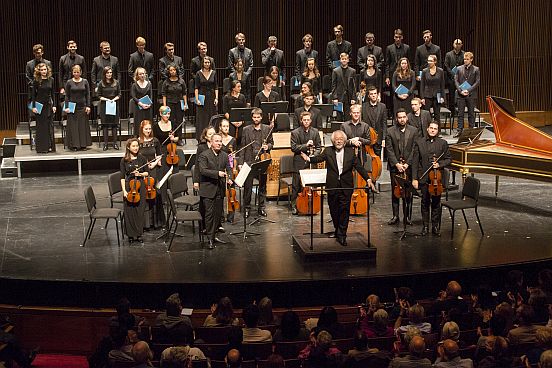 United States J.S. Bach: Juilliard415, Masaaki Suzuki (conductor),Yale Schola Cantorum, Peter J. Sharp Theater, Juilliard School, Lincoln Center, New York, 15.10.2015 (SSM)
United States J.S. Bach: Juilliard415, Masaaki Suzuki (conductor),Yale Schola Cantorum, Peter J. Sharp Theater, Juilliard School, Lincoln Center, New York, 15.10.2015 (SSM)

Nola Richardson, soprano
Daniel Moody, countertenor
Adele Grabowski, mezzo-soprano
Daniel McGrew, tenor
Tyler Ray, tenor
Brendan Fitzpatrick, bass
Matthew Sullivan, bass
J.S. Bach: Sinfonia from Cantata Am Abend aber desselbigen Sabbats, BWV 42
Mass in A Major, BWV 234
“Brandenburg” Concerto No. 3 in G Major, BWV 1048
Mass in G Minor, BWV 235
Looking at a copy of the manuscript of the cantata whose Sinfonia opened this concert, I was reminded that what came out of Bach’s mind and onto the paper went way beyond what anyone else has accomplished. Perhaps Bach could claim, as Vivaldi did, that he could write a concerto as fast as his pen was able to scrawl across a page. But much of Vivaldi’s music rearranges the same notes and adds a few more, and the 3-minute egg is done. Bach’s music never cuts corners, is never less than complex, never varies in quality: his late works are not terribly different from the first. The notes on the page continue to flow with ease from measure to measure.
The Sinfonia that opens this concert sounds very much like a triple concerto. Bach, as did most other composers of the period, borrowed from his own library as well as those of others. Several cantatas have opening instrumental or choral movements borrowed from extant works, such as the Brandenburgs or Orchestral Suites. This sinfonia has some glorious music: at one point, each of the soloists hands back and forth a melody, transforming a few notes into something so incredibly moving. The three instrumentalists played smoothly and with great assurance, keeping up admirably with the fast pace that Suzuki took: a pace slightly faster than his recorded performance.
The fact that Bach actually wrote Masses other than the Mass in B Minor may come as a surprise to many. We are familiar with other vocal forms in addition to the cantatas, such as the Oratorios, Passions and Motets. Why these Masses are so obscure is beyond me. If much of the content has been taken from other compositions, it’s the same case as in other, more popular, works of Bach: the Christmas Oratorio and arias from both Passions contain musical derivatives (called parodies) yet are still part of the standard Bach repertory. The Kyrie of the Mass in A Major is about the most upbeat beginning of a Mass until Haydn started writing.
The opening chorus of the Mass in G Minor is particularly lovely with the canonic entrances of the four vocal ranges and the slow, almost dance-like swaying. It contains several arias borrowed from earlier works, but even if somewhat familiar to the listener, they gain a new freshness in this different context.
As for the performance of the third Brandenburg, I will go out on a limb and state that it comes very close to being the best version that I can remember hearing. The instrumentalists played with passionate bravura. The last movement, done at a record-setting pace, never sounded strained or forced. All the string players were more than simply virtuosic, but the splendid Augusta McKay Lodge has to be singled out as an exceptional violinist.
In a performance a few days ago by the group Baroque Incorporated (which includes many Juilliard Historical Performance graduates), I commented on the risks of performing choral parts with one person per part. Here, with the Yale Scola Cantorum, there were no such worries. They sang with tremendous vitality, never wavering under the guidance of Suzuki, one of the few conductors to have recorded all the Bach cantatas. In whatever short period of time he had to rehearse these students, he drew from them a quality of sound certainly near, if not equal to, the instrumentalists and chorus of his Bach Collegium Japan.
There are other groups in the city performing Bach’s vocal music, some with Juilliard members, but to have one of the great masters of Bach on stage with one the best choruses and the top student orchestra in its field is to feel that, yes, we have made progress towards a better world.
Stan Metzger
Note: In a review I wrote several years back, I started with following comment:
Congratulations! But to whom and why so soon? Because my first prize goes not to the music and musicians, but to the “Notes on the Program” written by Robert Mealy. They are an example of how all program notes should be written: clear, concise and to the point.
Change Mr. Mealy’s name to Melanie Williams and you have an apt description of the program notes to this concert. Thoroughly researched and well-written, it doesn’t looks down at the readers nor does it oversimplify what are rather complex details. A star goes to Ms. Williams and another to her mentors at Juilliard.
SM